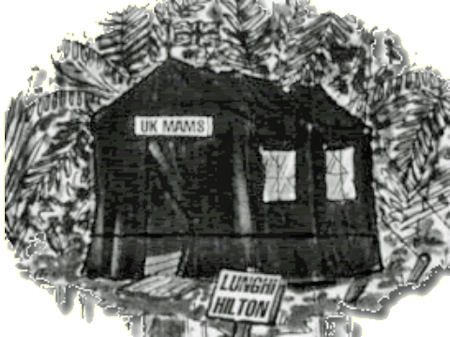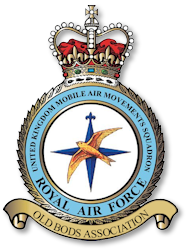
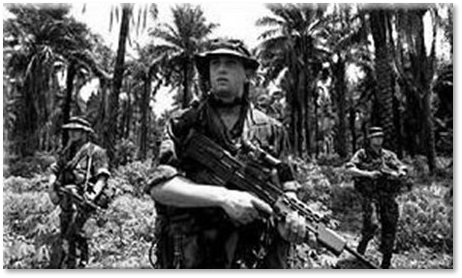
11 May 2000 - Foreign Secretary Robin Cook is facing a mounting crisis over Britain's role in Sierra Leone.
Their original mission was to oversee the evacuation of civilians but, as rebel troops continue to advance on Freetown, they are in danger of becoming inextricably embroiled in the conflict. There are already reports of British troops manning roadblocks on major routes into the capital, and that they are now offering support to the UN peacekeepers.
Mr Cook and Defence Secretary Geoff Hoon continue to insist that the troops are simply there to help evacuate civilians. And they have ruled out using them in a combat role. But Mr Cook is now facing the nightmare scenario of seeing his troops coming under rebel fire and having to decide whether or not to respond and escalate the crisis. He has already been forced to concede that the troops may have to stay in West Africa for weeks, rather than days, in a wider role.
Mr Cook and Defence Secretary Geoff Hoon continue to insist that the troops are simply there to help evacuate civilians. And they have ruled out using them in a combat role. But Mr Cook is now facing the nightmare scenario of seeing his troops coming under rebel fire and having to decide whether or not to respond and escalate the crisis. He has already been forced to concede that the troops may have to stay in West Africa for weeks, rather than days, in a wider role.
More than 300 UK, EU and Commonwealth citizens have already been evacuated from Freetown but dozens remain, with some having decided to stay.
Shadow Foreign Secretary Francis Maude, speaking in the House of Commons, raised the fear of ever deeper British involvement, stating: "Some officials have said the troops have been sent purely for evacuation purposes. Others have said that Britain is deploying troops to shore up a flagging UN operation. You have committed the UK to something that is more than an evacuation but less than a full-scale military intervention. As a consequence, we risk being sucked into Sierra Leone's civil war."
Mr Cook insisted he was not about to send British troops into combat but simply to aid the evacuation. But he said their very presence in securing Freetown's Lungi airport made a "real contribution" to the UN effort. He also said he would be reviewing the situation on a day-to-day basis. Mr Cook clearly wants to do whatever he can to ensure the UN peacekeeping effort is a success but is not prepared to send in combat troops, even if he could win approval, which is highly unlikely.
Shadow Foreign Secretary Francis Maude, speaking in the House of Commons, raised the fear of ever deeper British involvement, stating: "Some officials have said the troops have been sent purely for evacuation purposes. Others have said that Britain is deploying troops to shore up a flagging UN operation. You have committed the UK to something that is more than an evacuation but less than a full-scale military intervention. As a consequence, we risk being sucked into Sierra Leone's civil war."
Mr Cook insisted he was not about to send British troops into combat but simply to aid the evacuation. But he said their very presence in securing Freetown's Lungi airport made a "real contribution" to the UN effort. He also said he would be reviewing the situation on a day-to-day basis. Mr Cook clearly wants to do whatever he can to ensure the UN peacekeeping effort is a success but is not prepared to send in combat troops, even if he could win approval, which is highly unlikely.
Operation Palliser by Flt Lt Ellie Pook
Operation Palliser kicked off in May 2000. I can remember exactly where I was at the time - Bahrain, on RAFLO reforce duties. The operational deployment didn’t exactly affect my task, so I completed the task and returned to the UK.
On arriving back in Mobile Air Movements Squadron (MAMS) Ops, I noticed that the majority of tasking had fallen by the wayside - standard when something as big as Palliser starts. Teams and team leaders had been nominated for the operation and were in Dakar and Luhghi with the reforce and rotation options in place as and when they were required. My name hadn’t come into the equation for the rotation or reinforcement; not a problem - a chance to take a couple of days leave and book Common Core Skills (CCS). Having been on Mobile duties for a year and a bit by then I should have known better - a board free of tasking means that you are susceptible for anything that comes at short notice.
On arriving back in Mobile Air Movements Squadron (MAMS) Ops, I noticed that the majority of tasking had fallen by the wayside - standard when something as big as Palliser starts. Teams and team leaders had been nominated for the operation and were in Dakar and Luhghi with the reforce and rotation options in place as and when they were required. My name hadn’t come into the equation for the rotation or reinforcement; not a problem - a chance to take a couple of days leave and book Common Core Skills (CCS). Having been on Mobile duties for a year and a bit by then I should have known better - a board free of tasking means that you are susceptible for anything that comes at short notice.
With CCS booked for the following week and the reassurance that I wasn’t going anywhere near West Africa, I set about enjoying the days off.
The call screening facility was a little used function on the mobile phone, so naturally when it rang I answered. It was the Movements Operations Officer: “Your CCS has been booked for this afternoon, but can you come into MAMS Ops before you go to the Regiment Flight?” The alarm bells started to jangle. Having got all the bits and pieces together for CCS, I wandered into MAMS Ops. “Right, we’ve got you on the short CCS course this afternoon because you are off to Sierra Leone within the next 48 hours. You have a medical appointment tomorrow morning and you will be briefing tomorrow as well.”
The call screening facility was a little used function on the mobile phone, so naturally when it rang I answered. It was the Movements Operations Officer: “Your CCS has been booked for this afternoon, but can you come into MAMS Ops before you go to the Regiment Flight?” The alarm bells started to jangle. Having got all the bits and pieces together for CCS, I wandered into MAMS Ops. “Right, we’ve got you on the short CCS course this afternoon because you are off to Sierra Leone within the next 48 hours. You have a medical appointment tomorrow morning and you will be briefing tomorrow as well.”
“Oh, okay” was my response and the calm, unflustered image remained in place until I got to the car. PANIC! Although we all claim to have kit ready to go - where was the roll mat, spare boots, Maglite etc… worry about that later - let’s get CCS over and done with. CCS duly completed back up to MAMS Ops to see if there was any further information. Nothing further except that I had a flight number and time.
After visiting the Medical Centre for the brief on malaria and other nasty diseases that are rife in that part of the world and to pick up a supply of Larium, it was back to the squadron for the briefing, collection of additional kit and a phone call to the theatre for advice on what to take and what not to. Having packed and repacked (twice) I was ready to check in at Lyneham. After checking in I popped up to MAMS Ops to collect the mail, newspapers and other bits for the guys in theatre and a quick check of my mail slot (there was my F7500 to complete). The next 30 minutes were spent on deciding on preferences for future employment and what I’d done in the preceding 12 months. I can honestly say that the passenger terminal at RAF Lyneham is not world renowned for providing such inspiration at 01:30 hrs; nevertheless it provided a brief diversion to the forthcoming task.
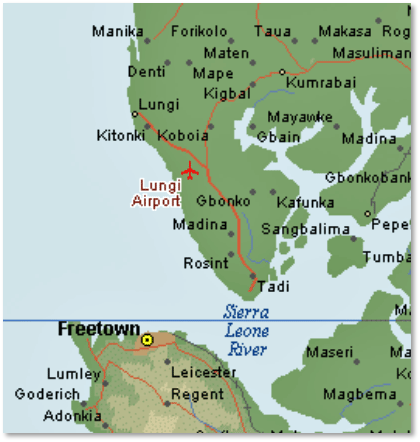
The flight to Dakar took more than 8 hours. There was a 36 hour stopover in Dakar, and then it was down to Lungi. The first hour of the flight to Lungi wasn’t too bad, the second; the butterflies started- apparently a natural reaction when going into the unknown. The flight sergeant on the team reassured me that it wasn’t too bad - he had, after all, spent two months working with the UN over Christmas and New Year 2000.
The approach to Lungi was turbulent. It was the rainy season and the thunderstorms were too bad for us to land so we turned around and went back to Dakar. After 4 hours of uncomfortable rest on the ‘frame the slip crew pitched up and flew us to Lungi - this time we got in. No chance for me to get off the aircraft for a look around, the frame had to be offloaded and loaded. Once that had been done I was able to get the handover from the team leader on the ground before he went back up to Dakar.
The approach to Lungi was turbulent. It was the rainy season and the thunderstorms were too bad for us to land so we turned around and went back to Dakar. After 4 hours of uncomfortable rest on the ‘frame the slip crew pitched up and flew us to Lungi - this time we got in. No chance for me to get off the aircraft for a look around, the frame had to be offloaded and loaded. Once that had been done I was able to get the handover from the team leader on the ground before he went back up to Dakar.
With the C130 en route to Dakar, I was able to take stock of the surroundings. Lungi was probably one of the most basic airports in the world; however, there were aircraft steps (whether they reached the height of a VC-10 or TriStar was irrelevant), a couple of power sets and other associated equipment. With al my kit gathered up I was taken to the accommodation a mere five minute walk from the far side of the pan, past the Chinooks to the veranda in the President’s lodge - luxurious accommodation with power, lights, an indoor swimming pool when it rained and a rat. It slept eight comfortably, had space for three desks, the satellite telephone worked and the medics were happy as they could hold a clinic there.
Once the domestics were sorted out it was on to the work bit. Up to the Joint Theatre Force Headquarters (JTFHQ), to meet various individuals, enjoy the air conditioning and marvel at the showers, cook tent, beds with built-in mosquito nets and the number of computers. Back to the ‘office’ via the hangar to meet Mr. Khabia, the airport manager (a man who would prove to be invaluable), and other UN and RAF staff. A more comprehensive brief took place in between the transport aircraft arriving and departing. “You must carry your SA80 when you walk up to JTFHQ, the hangar and ATC. Go everywhere in pairs, curfew and stand-to at first light and handle all transport aircraft arriving and departing Lungi.”
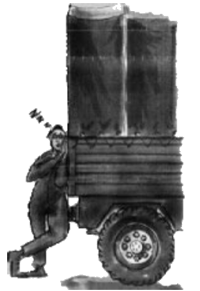
The aircraft and helicopter movements seemed continuous; if it wasn’t ours it was the UN’s. Despite being tired and wearing earplugs to block out some of the noise, the whine of the Antonov 124 engines as it taxied to its parking slot was enough to wake the dead! On top of the aircraft and helicopter movements, the phone rang at all hours and people snored or talked in their sleep and then a mosquito would buzz around your ear. Quality sleep was a rare commodity.
The most complex period of the detachment was the recovery of 1 Para and elements of the JTFHQ. Frantic load planning with changes every five minutes followed as everyone decided that they should be first out. In the end it was decided that the Paras would go first with other personnel on a fill-up basis and their equipment would be recovered on C-130s.
Once that decision had been made we were able to deconflict the (RAF) aircraft flow, load plan, get a system in place for the checking and preparation of the equipment and paperwork and, along with ATC staff, devise a parking plot. Needless to say the planning proved invaluable, but when you are working and operating on the same pan as the UN you are better off just ‘cuffing it.’
Once that decision had been made we were able to deconflict the (RAF) aircraft flow, load plan, get a system in place for the checking and preparation of the equipment and paperwork and, along with ATC staff, devise a parking plot. Needless to say the planning proved invaluable, but when you are working and operating on the same pan as the UN you are better off just ‘cuffing it.’
The management challenge was to ensure that the boys were in a fit state to handle the aircraft and to drive the aircraft handling equipment. They had to be well rested, eat properly and drink enough to keep going but more importantly, as the locals were assisting with the driving of the tractors and tugs, that they understood the word and signals for stop!
The recovery of 1 Para and the JTFHQ was completed on time and the Royal Marines replaced the Paras , which eased our workload a little. The deployment of equipment for the Royal Anglians started, then came their personnel - they had been tasked to provide the training for the Sierra Leone Army.
The recovery of the Marines and the final elements of the JTFHQ continued in between a visit by the Foreign Secretary, and then it was time for the team to go home giving another team a chance to enjoy the challenges of an operational theatre.
The recovery of the Marines and the final elements of the JTFHQ continued in between a visit by the Foreign Secretary, and then it was time for the team to go home giving another team a chance to enjoy the challenges of an operational theatre.
The work was hard, hours were long, decent sleep was non-existent, but spirits remained high despite the heat, humidity, boil-in-the-bag food, mosquitoes and constant changes to the plan. Why?
We could see our contribution to the peace keeping effort and the fact that it was appreciated - a job done well in exacting circumstances. All this based in a 12 x 12 tent with duck boards on the floor, right-angle torches and a couple of solar shower bags - a five-star luxury in a place like Lungi.
We could see our contribution to the peace keeping effort and the fact that it was appreciated - a job done well in exacting circumstances. All this based in a 12 x 12 tent with duck boards on the floor, right-angle torches and a couple of solar shower bags - a five-star luxury in a place like Lungi.
